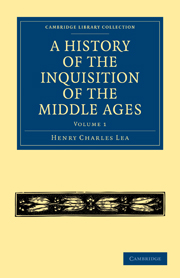Book contents
- Frontmatter
- PREFACE
- Contents
- BOOK I—ORIGIN AND ORGANIZATION OF THE INQUISITION
- CHAPTER I THE CHURCH
- CHAPTER II HERESY
- CHAPTER III THE CATHARI
- CHAPTER IV THE ALBIGENSIAN CRUSADES
- CHAPTER V PERSECUTION
- CHAPTER VI THE MENDICANT ORDERS
- CHAPTER VII THE INQUISITION FOUNDED
- CHAPTER VIII ORGANIZATION
- CHAPTER IX THE INQUISITORIAL PROCESS
- CHAPTER X EVIDENCE
- CHAPTER XI THE DEFENCE
- CHAPTER XII THE SENTENCE
- CHAPTER XIII CONFISCATION
- CHAPTER XIV THE STAKE
- APPENDIX
CHAPTER XII - THE SENTENCE
Published online by Cambridge University Press: 29 August 2010
- Frontmatter
- PREFACE
- Contents
- BOOK I—ORIGIN AND ORGANIZATION OF THE INQUISITION
- CHAPTER I THE CHURCH
- CHAPTER II HERESY
- CHAPTER III THE CATHARI
- CHAPTER IV THE ALBIGENSIAN CRUSADES
- CHAPTER V PERSECUTION
- CHAPTER VI THE MENDICANT ORDERS
- CHAPTER VII THE INQUISITION FOUNDED
- CHAPTER VIII ORGANIZATION
- CHAPTER IX THE INQUISITORIAL PROCESS
- CHAPTER X EVIDENCE
- CHAPTER XI THE DEFENCE
- CHAPTER XII THE SENTENCE
- CHAPTER XIII CONFISCATION
- CHAPTER XIV THE STAKE
- APPENDIX
Summary
The penal functions of the Inquisition were based upon a fiction which must be comprehended in order rightly to appreciate much of its action. Theoretically it had no power to inflict punishment. Its mission was to save men's souls; to recall them to the way of salvation, and to assign salutary penance to those who sought it, like a father-confessor with his penitents. Its sentences, therefore, were not, like those of an earthly judge, the retaliation of society on the wrong-doer, or deterrent examples to prevent the spread of crime; they were simply imposed for the benefit of the erring soul, to wash away its sin. The inquisitors themselves habitually speak of their ministrations in this sense. When they condemned a poor wretch to lifelong imprisonment, the formula in use, after the procedure of the Holy Office had become systematized, was a simple injunction on him to betake himself to the jail and confine himself there, performing penance on bread and water, with a warning that he was not to leave it under pain of excommunication, and of being regarded as a perjured and impenitent heretic. If he broke jail and escaped, the requisition for his recapture under a foreign jurisdiction describes him, with a singular lack of humor, as one insanely led to reject the salutary medicine offered for his cure, and to spurn the wine and oil which were soothing his wounds.
- Type
- Chapter
- Information
- A History of the Inquisition of the Middle Ages , pp. 459 - 500Publisher: Cambridge University PressPrint publication year: 2010First published in: 1888

